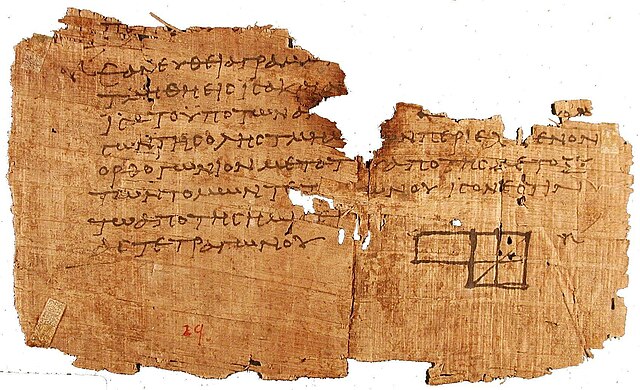On the Shoulders of Giants #1

Euclid was an ancient Greek mathematician. He is most famous for his book “The Elements”. He probably lived in the City of Alexandria in about 300 BC, but there is not much reliable historical evidence for his existence. All of the records about him were written several centuries later. This doesn’t mean he wasn’t a real person and there are often no records of many historical people. A lot fewer documents were written down and passed on in the way that we do today. It is assumed that he was a real person. It is thought that he was born after Plato, and was possibly educated at a Platonic school. He was possibly alive during the time of Archimedes because Archimedes mentions him as the author of “The Elements” and Euclid used some of the ideas of Archimedes in his book.
So, what did Euclid do and why is he important? He is called the “father of geometry”, but he didn’t invent geometry. He did something else that made geometry, and mathematics as a whole, much easier and more reliable. He realized that the basic tenets of mathematics needed to be proved. Before him, a lot of things were assumed by mathematicians as being true, but they were never proven. Euclid realized that mathematics could not work without these foundational assumptions being proved, so that is what he set out to do in his book, “The Elements”. He called his book “The Elements” because he was looking at the foundations of mathematics and the elements were the constituent parts that made up the whole.
Euclid wrote other books, but it is for his “The Elements” that he is remembered. It is worth noting that he probably didn’t write all 13 of the books in “The Elements”. Studies of the language used and the style of writing show that some of the books were added later on. This was not uncommon with ancient books. However, he wrote the earlier books and the list of axioms that he is remembered for.
Elements broke mathematics down into 13 different books with his “The Elements”. Books 1 to 4 and book 6 dealt with plane geometry, books 5 and 10 dealt with magnitudes and ratios, books 7 to 9 dealt with whole numbers, and books 11 to 13 dealt with solid geometry. Euclid then took 10 mathematical concepts that were assumed to be true and he proved them. These then became his ten axioms, or foundations of mathematics. He wrote these ten rules in the first book of “The Elements”. These are his 10 axioms:
Let the following be postulated:
1 To draw a straight line from any point to any point[k]
2 To produce a finite straight line continuously in a straight line
3 To describe a circle with any centre and distance
4 That all right angles are equal to one another
5 That, if a straight line falling on two straight lines make the interior angles on the same side less than two right angles, the two straight lines, if produced indefinitely, meet on that side on which are the angles less than the two right angles
No. Common notions
1 Things which are equal to the same thing are also equal to one another
2 If equals be added to equals, the wholes are equal
3 If equals be subtracted from equals, the remainders are equal
4 Things which coincide with one another are equal to one another
5 The whole is greater than the part
These seem like basic concepts, but they had never been proved before. Euclid proved all of them. He was trying to reduce mathematics to its elemental foundations and make sure they were true. Descartes did something centuries later when he came up with his “I think therefore I am” idea.
Euclid is known as the “father of geometry” because he wrote down a lot of ideas that were and still are used in geometry, but he gave far more to mathematics and society than that. He showed that mathematics needed to be logical and every statement had to be proven. He showed that fundamentals could only be used if they were provably true. This new way of thinking became important not just for mathematics, but also for philosophy, history, and almost every other branch of education and life. His axioms were also explained in a very simple language and showed that mathematics could be comprehended by any person that could read. Euclid brought so much to mathematics that he is listed as one of the most important mathematicians of all time. And this is what I learned today.
Image By Euclid – http://www.math.ubc.ca/~cass/Euclid/papyrus/tha.jpg, Public Domain, https://commons.wikimedia.org/w/index.php?curid=1259734
Sources
http://scihi.org/euclid-geometry/
https://en.wikipedia.org/wiki/Euclid
http://scihi.org/euclid-geometry/
https://mathshistory.st-andrews.ac.uk/Biographies/Euclid/
https://blog.sciencemuseum.org.uk/euclid-a-great-mind-of-ancient-greece/
